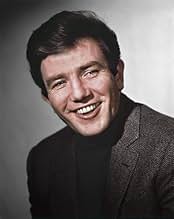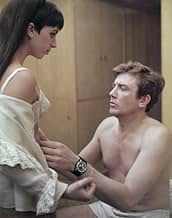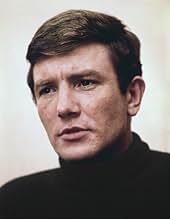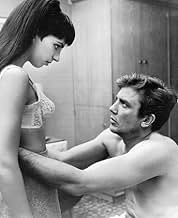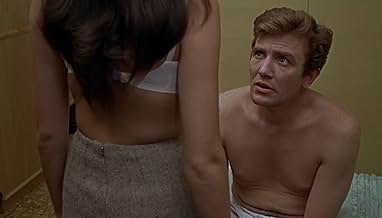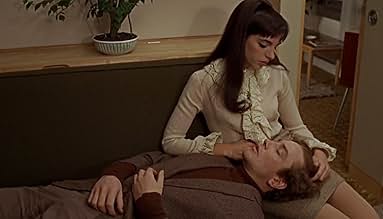VALUTAZIONE IMDb
6,3/10
898
LA TUA VALUTAZIONE
Aggiungi una trama nella tua linguaA married writer has an affair with his secretary.A married writer has an affair with his secretary.A married writer has an affair with his secretary.
- Ha vinto 1 BAFTA Award
- 3 vittorie totali
Recensioni in evidenza
This excellent film is about the effects of displacement, of being a fish out of water. Working-class Charlie Bubbles has ascended from his humble origins to become a successful writer. He has clearly not handled the transition well from within, but it's hardly surprising when there are so many hurdles to overcome in the world outside of himself. The story would have been familiar to a lot of people in Britain in the 60s, as the first generation to benefit from the post-WW2 welfare state came to adulthood. CHARLIE BUBBLES nails this more effectively than any other film I know. Playwright Shelagh (A TASTE OF HONEY) Delaney's script is full of acute observation; the acting is marvellous, the cinematography (by a young Peter Suschitzky, now better known as David Cronenberg's DOP) noticeably European, the charming score (by Misha Donat - Mr Suschitzky's sister) a nod to to the work of Georges Delerue and Nino Rota. Indeed, the movie as a whole leans more towards New Wave and Fellini than the realistic school in which Finney made his name as an actor. Here he is also the director - his one and only feature film in that capacity - and a very creditable achievement it is too. How CHARLIE BUBBLES reads to people unfamiliar with its social and historical background, I don't know. For me it is one of the finest British films of the sixties, but it somehow gets overlooked in the enthusiasm for THE LONELINESS OF THE LONG-DISTANCE RUNNER, A KIND OF LOVING and of course Saturday NIGHT AND Sunday MORNING. They are all fine films, but so is this one. Re-assessment in its favour is long overdue.
Although the apparent unhappiness of Finney as a successfull, and rich writer might seem difficult to accept, think of all the things you thought of as beyond you as a kid. Some of the people reading these words are making a lot of money, live in a beautiful house, have a beautiful, handsome, wife, husband, and dread each new day. Some of it is good old chemical deppression, and some of it is, who the hell knows. That Finney, a working class kid, realized this at such a young age makes me respect him even more than my admiration for him as an actor. The film I feel looks back to the post WW2 Italian existential movies where very little happens. Life is almost slow motion wandering around. Witness Finney's pitiful relationship with his son and his complete lack of interest in his legal an financial affairs with his lawyers in the opening scene. The cast is wonderful. I'm sure the idea of Liza Minelli as his assistant was laughed at. Liza, playing with British pros? Are you kidding? But it works. Billie Whitelaw was born for the movies, and is incidentally Samuel Beckett's favorite actress. She has premiered many of his plays. That Julia Roberts is a superstar, and few people know who Billie Whitelaw is, says something about "something". As a personal aside, one of the great supporting character actors, the late Colin Blakely, who plays Finney's failed sidekick and I, met in front of a London theatre. I told him I came all the way from the US to tell him how wonderful I thought he was. "Did you see my show tonight", he asked. "No sir, I haven't had a chance yet", I replied. He quickly turned away, and walked in a different direction!!!!
I think it's a classic existentialist movie, very much of the European school. Man can never be truly happy or satisfied, with what he's got or with what he gets even if all his ambitions and dreams come true.I think Albert Finney has done an amazing job. It takes true guts and real skill to make a film like this and 'get life' out of it without resorting to fist fights, car chases and shootouts. I love the small moments, like where he puts the eyelashes on his sons lip to make a 'moustache', or when his wife takes the tea cup and his acting when he reaches for it. Billie Whitelaw looks super-sexy in the film and her performance is beautiful. Her gaze at him when he's tucked in bed said more than a million lines of dialogue could. I wish Mr Finney had directed more films, if his debut as a director was this good, imagine what would have come after a few more films. Aah we'll never know...
A few unwelcome scatological moments of surreal humour not withstanding, Albert Finney's only film as a director, "Charlie Bubbles", remains both a remarkable period piece and one of the most imaginative British films of the sixties, perhaps not the masterpiece I first thought it to be, (it was my best film of the year), but unmissable nevertheless. Finney made it in 1968, from an original screenplay by Shelagh Delaney, a time when the Kitchen Sink was no longer fashionable and a new kind of New Wave, typified by films like Nicolas Roeg and Donald Cammell's "Performance" and Richard Lester's "Petulia", was coming into play. This is certainly good enough to make you wish Finney had directed again.
He plays a working-class writer who has made it big, (he drives a Rolls and his books have been turned into films), and the film is set over the weekend he drives North and back to his roots with his unofficial secretary in tow, (a very good, if unlikely, Liza Minnelli), to see his nine year old son, (a first-rate Timothy Garland), who lives on a farm with Charlie's ex-wife, (a terrific Billie Whitelaw). Not much happens and at times Delaney's screenplay is a little too Pinteresque for its own good, but it's also a richly observant picture of Britain at a particular moment in time and is greatly enhanced by the superb cinematography of Peter Suschitzky.
He plays a working-class writer who has made it big, (he drives a Rolls and his books have been turned into films), and the film is set over the weekend he drives North and back to his roots with his unofficial secretary in tow, (a very good, if unlikely, Liza Minnelli), to see his nine year old son, (a first-rate Timothy Garland), who lives on a farm with Charlie's ex-wife, (a terrific Billie Whitelaw). Not much happens and at times Delaney's screenplay is a little too Pinteresque for its own good, but it's also a richly observant picture of Britain at a particular moment in time and is greatly enhanced by the superb cinematography of Peter Suschitzky.
I understand that there was a real problem getting this film a theatrical release and that it is more a mid-sixties film than a late 60s one, not being released in the UK until 1969. I can understand the reluctance of distributers. With the best will in the world and considering that this may have been a heart felt effort to produce a European style thought provoking drama, it is hard to see this as anything other than a misguided and pretentious, vanity project. It starts disastrously with a reunion with a working class chum (who over does it enormously) with whom because he is now rich and famous somehow cannot relate. Plus the unforgivable homoerotic messy food prank in the posh restaurant. Things go from bad to worse, I don't know whether Shelagh Delaney's script was scrapped or that this drivel really was hers, either way the only saving grace are those fantastic Lancashire city and landscape shots. The views of what I assume to be the Manchester ship canal an added bonus, as for the rest, no thanks. Oh and the miscasting of Liza Minnelli is inexplicable, she is dreadful.
Lo sapevi?
- QuizThis was a very personal project for Albert Finney, who made his debut as director with it and made it for his own company, Memorial Enterprises. He got fairly lavish backing from an American company, Universal, who were trying to set up a system for making films in England, but then had the greatest difficulty in getting the finished film shown. He made the film in 1966, but, although advance word on it was very positive, and the film eventually won awards as well as rave reviews, it was not shown in either the US or Britain until 1968; its American opening was well over six months in advance of its British one. Finney did his best to promote the film in several countries, but it was written off as a box-office failure. He hoped to direct in films again, and announced a film to be called "The Girl In Melanie Klein" in the early 1970s; but he never made it and never directed another theatrical feature.
- BlooperThe credits suggest that the place where Charlie and Eliza meet the airman is a cafe. It is not: places on the motorway where refreshments and fuel can be obtained are called motorway service stations in Britain.
- Citazioni
Charlie Bubbles: The back door was wide open. Anybody could have walked in instead of me. You might have got a sex maniac.
Lottie Bubbles: Not with my luck.
- ConnessioniReferenced in Stella Street: Very Twisty Turny (2000)
I più visti
Accedi per valutare e creare un elenco di titoli salvati per ottenere consigli personalizzati
- How long is Charlie Bubbles?Powered by Alexa
Dettagli
- Data di uscita
- Paese di origine
- Lingua
- Celebre anche come
- Charlie Bubbles
- Luoghi delle riprese
- Aziende produttrici
- Vedi altri crediti dell’azienda su IMDbPro
- Tempo di esecuzione1 ora 29 minuti
- Proporzioni
- 1.85 : 1
Contribuisci a questa pagina
Suggerisci una modifica o aggiungi i contenuti mancanti



